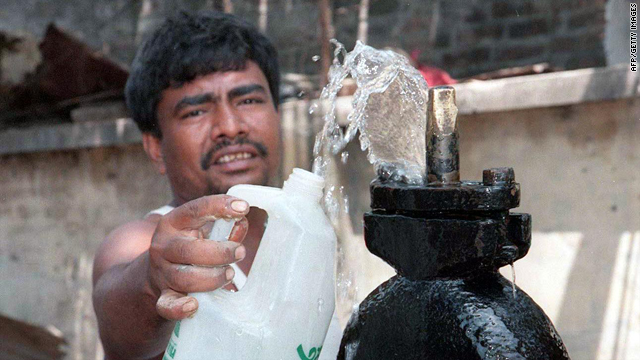by Christine Lepisto, Berlin  on 06.20.10
on 06.20.10

Image: Asia Arsenic Network
Mass poisonings due to arsenic contaminated water in Bangladesh are the tragic unintended consequence of humanitarian efforts to alleviate disease in Bangladesh by building many deep tube wells to produce water for drinking and irrigation. On Saturday, the results of a ten year, large population study of the link between arsenic contamination and diseases or death in Bangladesh were published in The Lancet. The study's authors come to a disturbing conclusion:
More than twenty percent of deaths in the study population of 12,000 Bangladeshis can be attributed to arsenic poisoning. Half of Bangladeshis, up to 77 million people, have been exposed to the toxic metal, known for causing cancer and long term effects on organs such as the liver, skin, kidney and the cardiovascular system. The WHO is quoted calling the case the "largest mass poisoning of a population in history" by escience news.
The news gets worse: the study suggests that lowering arsenic exposure in people whose earlier test results established a high baseline level does not reduce the mortality rate. In other words, just getting clean water to people already exposed may not help prevent the chronic risks of arsenic poisoning.
It all started with millions of deep tube wells installed in the 1970s by humanitarian organizations trying to reduce deaths from waterborne pathogens. The switch away from disease-carrying surface waters to "clean" deepwell supplies successfully lowered deaths from waterborne illnesses. But as time went by, consumers of the deepwell water and crops irrigated with the well water began to show mysterious symptoms that were determined to result from arsenic exposure. Arsenic drawn out of the deep aquifers has now spread the contamination to surface waters and sediments underlying them, leaving no source of safe water.
Only a quarter of the 12,000 people studied were exposed to levels within the WHO-established safe guideline (under 10 micrograms per liter). The upper quartile had exposures averaging 27 times the WHO limit. This is the first study that is based on individual samples instead of estimated group exposures. Samples were collected by more than a hundred people who traveled to remote regions of Bangladesh to test well water and collect biological samples which can establish the level of actual exposures in individual people. The large test population and ranges of exposures allows better definition of the dose-response reaction to arsenic. It is hoped that this and further studies can help to define health effects of exposure to low levels of arsenic, similar to levels found in some regions of the US and other countries.
More on Arsenic in Drinking Water:
Getting to the Bottom of the World's Biggest Mass Poisoning Case
Low Levels Of Arsenic In Drinking Water May Suppress Human Immune Response To Influenza
'Nanorust' Removes Arsenic From Polluted Water
Inexpensive Arsenic Filtration System Based on Cattails Could Help Clean Up the Drinking Water of 57 Million People"
All-Purpose Water Filters For Humanitarian Projects
NASA Testing Breakthrough In Water Safety

The "Largest Mass Poisoning in History": Arsenic in Bangladesh
__._,_.___

